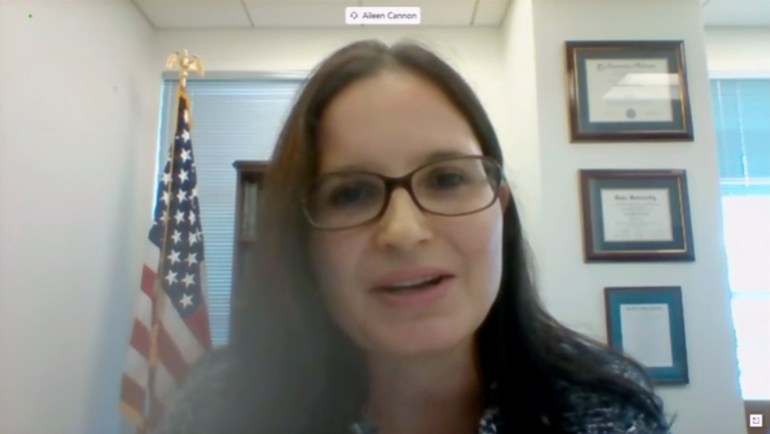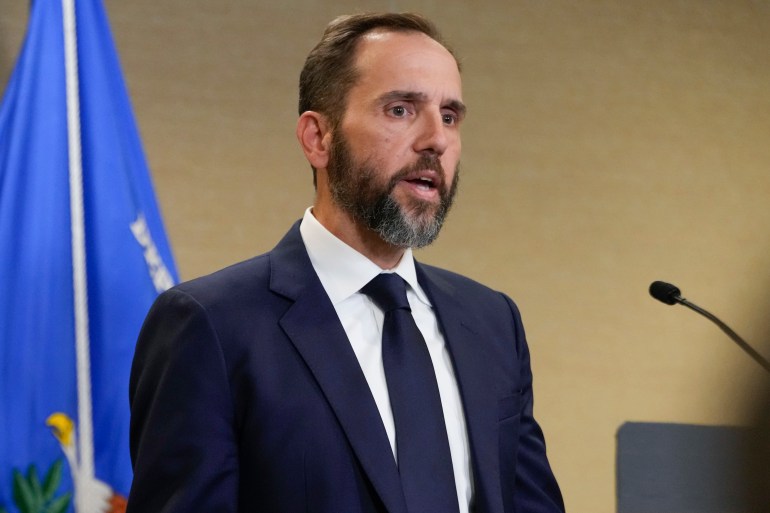United States prosecutors involved in the criminal indictment of Donald Trump in Florida have questioned a judge’s order that they indicate risks tipping the case in the former US president’s favour.
Their 24-page filing was issued late on Tuesday, as part of an ongoing case looking into Trump’s handling of classified documents after leaving office.
In the filing, Special Counsel Jack Smith and his team of prosecutors rebuked Judge Aileen Cannon for ordering that instructions be provided to an eventual jury suggesting that Trump could have kept the classified documents as part of his “personal” record-keeping.
The judge’s order appeared to be a hat tip to the defence’s argument that the Presidential Records Act (PRA) entitled Trump to keep the sensitive government documents, something Smith and his team have disputed.
“That legal premise is wrong,” Smith and his colleagues wrote, adding that any jury instruction to that effect would “distort the trial”.
The court filing was an unusual display of public discord between the prosecutors and the judge, who Trump nominated to the bench.
Questions over judge
Judge Cannon, who serves on the federal court in the Southern District of Florida, has previously faced scrutiny over decisions she has made in the long-running classified document case.
In September 2022, for instance, she granted the Trump legal team’s request to have a “special master” appointed to filter through the classified documents retrieved from the former president’s home at Mar-a-Lago in Palm Beach, Florida.
Legal experts decried the move as unprecedented, and it delayed the US Department of Justice from having full access to the documents as part of its investigation. An appeals court ultimately ended the special master’s review.
In Tuesday’s court filing, meanwhile, Special Counsel Smith and his team argued that Judge Cannon’s order would not only colour a prospective jury’s perception of the facts, but also slow the case down significantly.
No trial date has been set in the classified documents case. It was the first federal criminal indictment Trump faced as a result of Smith’s investigations.
“Whatever the Court decides, it must resolve these crucial threshold legal questions promptly,” Smith and his colleagues wrote. “The failure to do so would improperly jeopardize the Government’s right to a fair trial.”

Allegations of withholding documents
The case began in 2021, shortly after Trump left office that January. According to the indictment, the National Archives and Records Administration attempted to retrieve classified documents it believed remained with the former president.
But Trump and his allies allegedly refused to return the documents, instead attempting to conceal them in unsecured locations at his Mar-a-Lago estate, including in a bathroom and shower area.
In March 2022, the Federal Bureau of Investigation opened a criminal investigation into the matter, and a grand jury subpoenaed Trump to return all the classified records.
Special Counsel Smith, who was appointed by the US Justice Department that November, has accused Trump of obstructing that subpoena and other efforts to recuperate the documents, which contained national security secrets.
The government ultimately recovered more than 300 classified documents from the Mar-a-Lago resort, where dozens of public events had taken place.
Trump faces 40 felony charges in relation to the classified documents case. His aid Walt Nauta and Mar-a-Lago employee Carlos De Oliveira were also charged.
Multiple legal battles
The former president, however, has consistently denied wrongdoing and pleaded not guilty. As part of his defence, he argued that he had declassified the documents before leaving office, though audio recordings have since surfaced where he indicates otherwise.
“As president, I could have declassified, but now I can’t,” Trump said in a piece of audio from 2021.
Trump’s legal team has also raised the question of whether these documents fall in the realm of “personal” records under the Presidential Records Act.
But in Tuesday’s court filings, Smith and his fellow prosecutors sought to quash that argument.
“Trump has never represented to this Court that he in fact designated the classified documents as personal,” they wrote. “The reason is simple: he never did so.”
Smith and his team also asserted that, by invoking the Presidential Records Act, Trump sought to make his actions “impervious” to judicial review.
“It would be pure fiction to suggest that highly classified documents created by members of the intelligence community and military and presented to the President of the United States during his term in office were ‘purely private’,” the court filings said in one sharply-worded section.
Trump is the subject of four separate criminal indictments, including the classified documents case. He has framed all four, however, as being the product of a politically motivated “witch hunt” designed to derail his re-election efforts in November.
The first slated to go to trial is a state-level case in New York, concerning alleged hush-money payments during the 2016 presidential race. It is scheduled to start on April 15.


